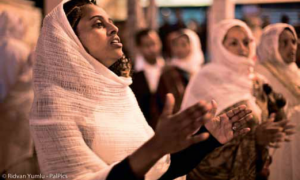Gathered in a church outside Khartoum for a midweek lecture are a group of Eritrean Christians. You wouldn’t know it, but scars of oppression at the hands of their government linger just beneath the surface for most of them. Yet here they are, singing songs of praise about what Jesus has done; listening with their Bibles open. They are participating in the very activities that have brought great suffering to their lives.
 Many of these men and women, including the pastor, have been imprisoned—and they each have friends and family members locked away for their faith. Right now. “It’s easy to sit here like this now sharing these stories,” one man who was tortured tells me after the service. “But to go through the sufferings we’ve been through is very difficult.”
Many of these men and women, including the pastor, have been imprisoned—and they each have friends and family members locked away for their faith. Right now. “It’s easy to sit here like this now sharing these stories,” one man who was tortured tells me after the service. “But to go through the sufferings we’ve been through is very difficult.”
Eritrea, in north east Africa, is home to four main religious communities: Muslims, Coptic Christians, Roman Catholics and Protestants. All but the latter are tolerated in the country of six million people, which the UN announced earlier this year is keeping between 5,000 and 10, 000 political prisoners. Many of those are Christians who were hauled off by authorities and thrown into jail during church services.
“There are many Eritrean Christians in prison,” says one of a group of men who form a small circle to share their stories with me. “It’s because of their faith. The government is hunting them.”
Exactly why the government would target Christians is a question Jesus himself addressed: “If the world hates you, keep in mind that it hated me first.” (John 15:18.) In Eritrea, the spread of the gospel has proven a threat to the fabric of society. “The evangelical movement,” says a young English-speaking, Pentecostal man, “was moving very fast. Young people were leaving Catholic and Coptic churches to join evangelical churches.”
He gives his own testimony. “Before I joined a Pentecostal church I had many problems in my life. And no one was teaching me the word of God. But when I went along I heard that I needed to come to God.” He said that previously when he attended a Catholic church he had no idea what the priest was talking about.
The men tell of how they fled to Sudan – a few directly after their release from prison. They also tell stories of small victories – keeping pages of the Bible folded into their underwear so they could meditate on God’s promises in prison. For now Sudan is a better place for them to live. But they fear the peace won’t last. They simply ask for our prayers. “The situation in our country is very bad, and we need God to work to bring freedom so Christians are able to worship. It’s a big problem.”
Email This Story
Why not send this to a friend?
